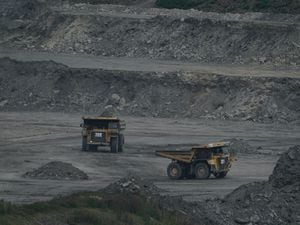Mixed feelings as England’s last major coal mine shuts
Campaigners argue coal should remain in the ground, while the mining firm says the UK still needs it for industry.

England’s last major coal mine is closing, heralding an end to an industry which stretches back to Roman times.
Banks Mining’s operations at its Bradley surface mine in County Durham have ceased while it waits on the Government to give its ruling on opening a new site near a picturesque Northumberland beach.
The firm says it has 250 employees but no coal, with only a few remaining roles for staff involved in restoring its sites.
Lewis Stokes, community relations manager for Banks, said: “We hate having to make people redundant.

“But with the Government refusing to allow replacement surface mines, our coal miners have no coal to mine.
“What is galling to them is that they know that for many years to come, our steel and cement industries will rely on coal.
“That coal will be imported mainly from Russia.”
The firm argued that bringing coal in for the UK’s steel and cement industries was bad for the environment due to the emissions caused by shipping it over.
Local planners turned down Banks’s bid to extend the Bradley site, which was blockaded early this year by Extinction Rebellion protesters.

A controversial planning application for the Highthorn site, near Druridge Bay, Northumberland, remains with Robert Jenrick’s Communities Department.
Lynne Tate, from campaign group Save Druridge, which opposes the Banks Mining application, was pleased coal production was ending on a large scale in England.
She said: “I’m glad for the fact I can look at my children and grandchildren and say at least the UK is trying to do something about climate change.
“If we carried on as we were, we would be no better than China and Russia and all those other places.

“It is the case that these countries have signed up to reducing CO2 emissions into the atmosphere, we all know it has to come down.”
A business in Derbyshire is still producing coal and aggregates from a brownfield site until next summer, but employs around 15 people, as opposed to the 250 who worked at Banks’s three sites.
A coal site in Wales continues to operate.
Friends of the Earth’s campaigns director Jamie Peters said: “Communities are rightly proud of their heritage, but now coal must be consigned to the history books if we’re to prevent climate breakdown, and protect people from the increasingly severe heatwaves, storms, floods and droughts that are already battering the planet.
“Jobs can be created by investing instead in energy efficiency and the UK’s thriving renewables industry.
“A green and fair recovery from Covid should be at the heart of all decisions the Government takes so that we can emerge into a better, fairer future.”





